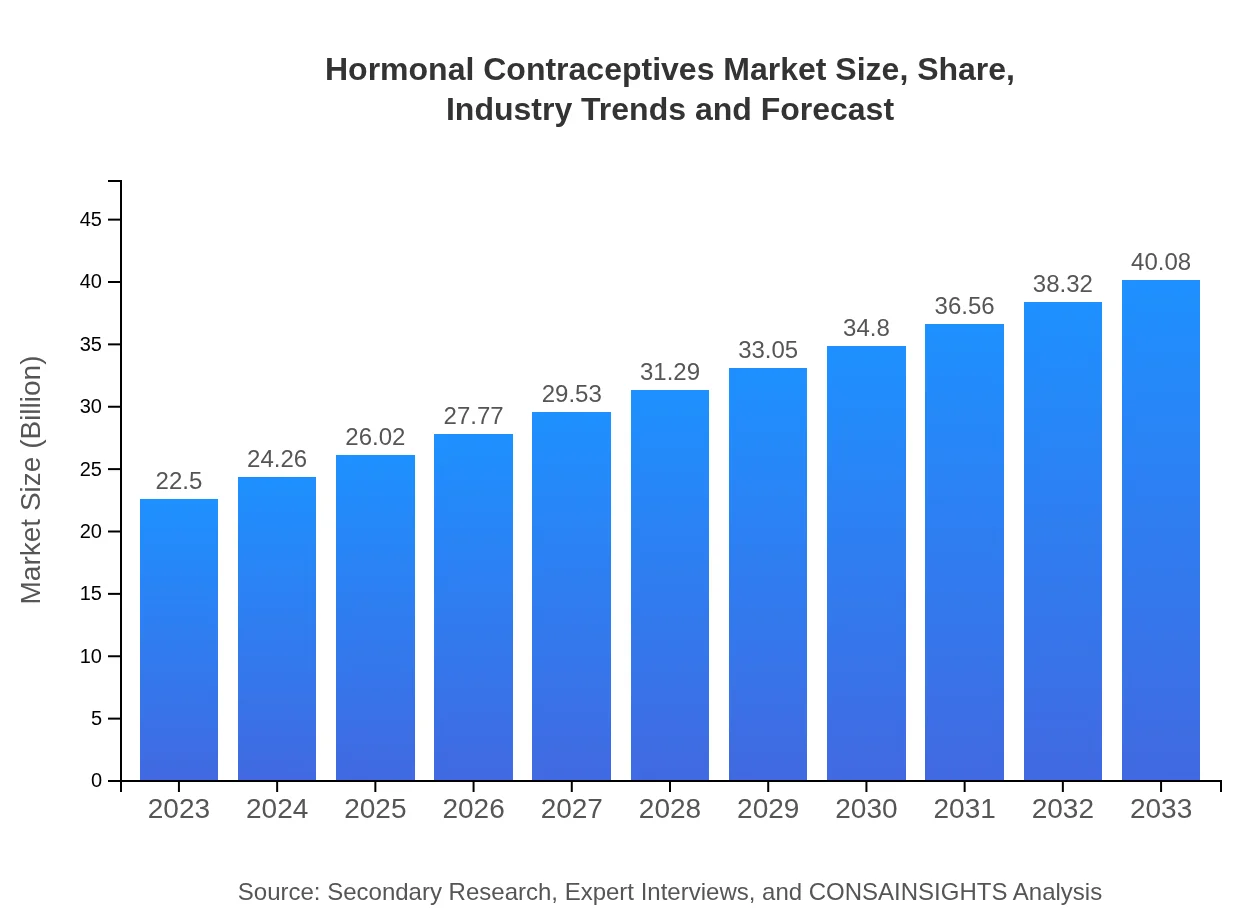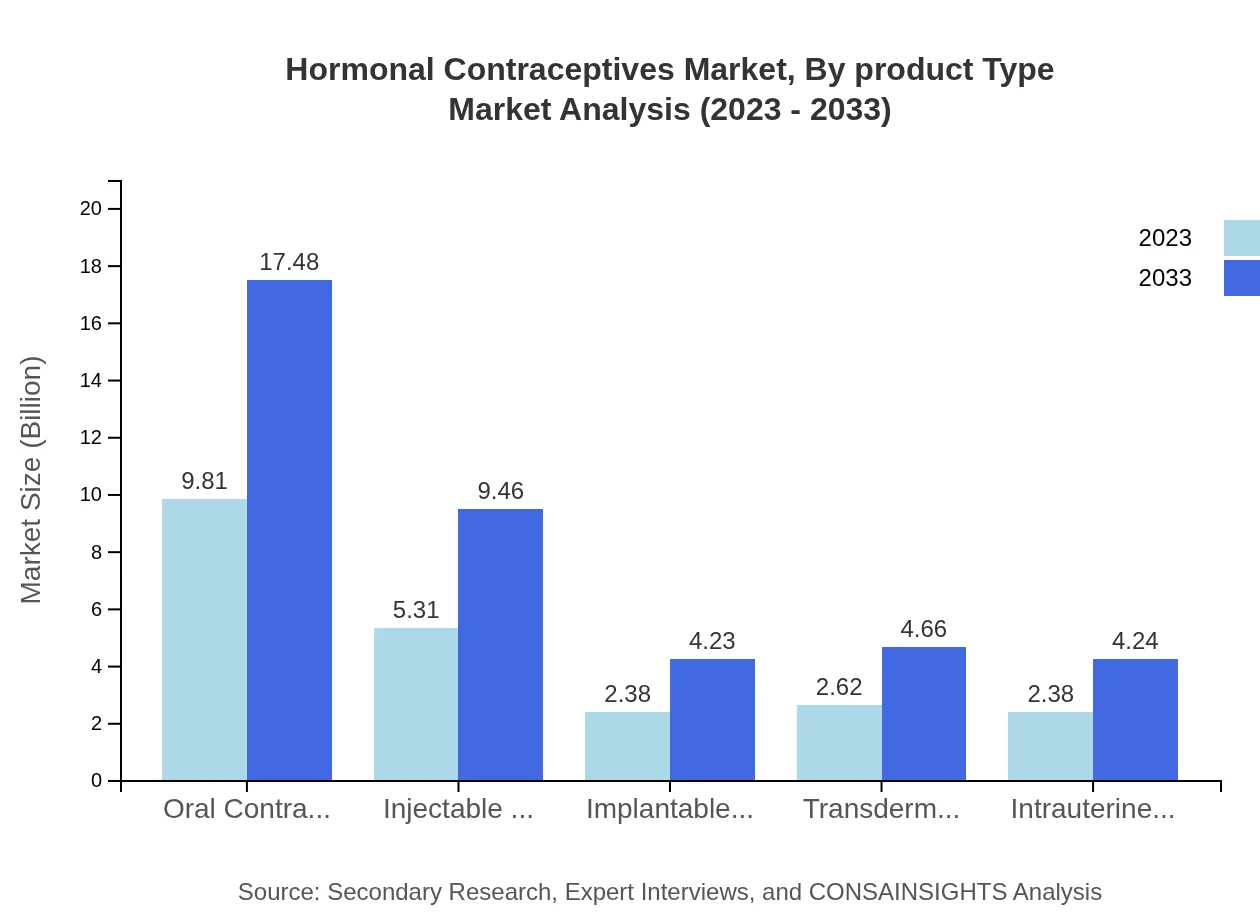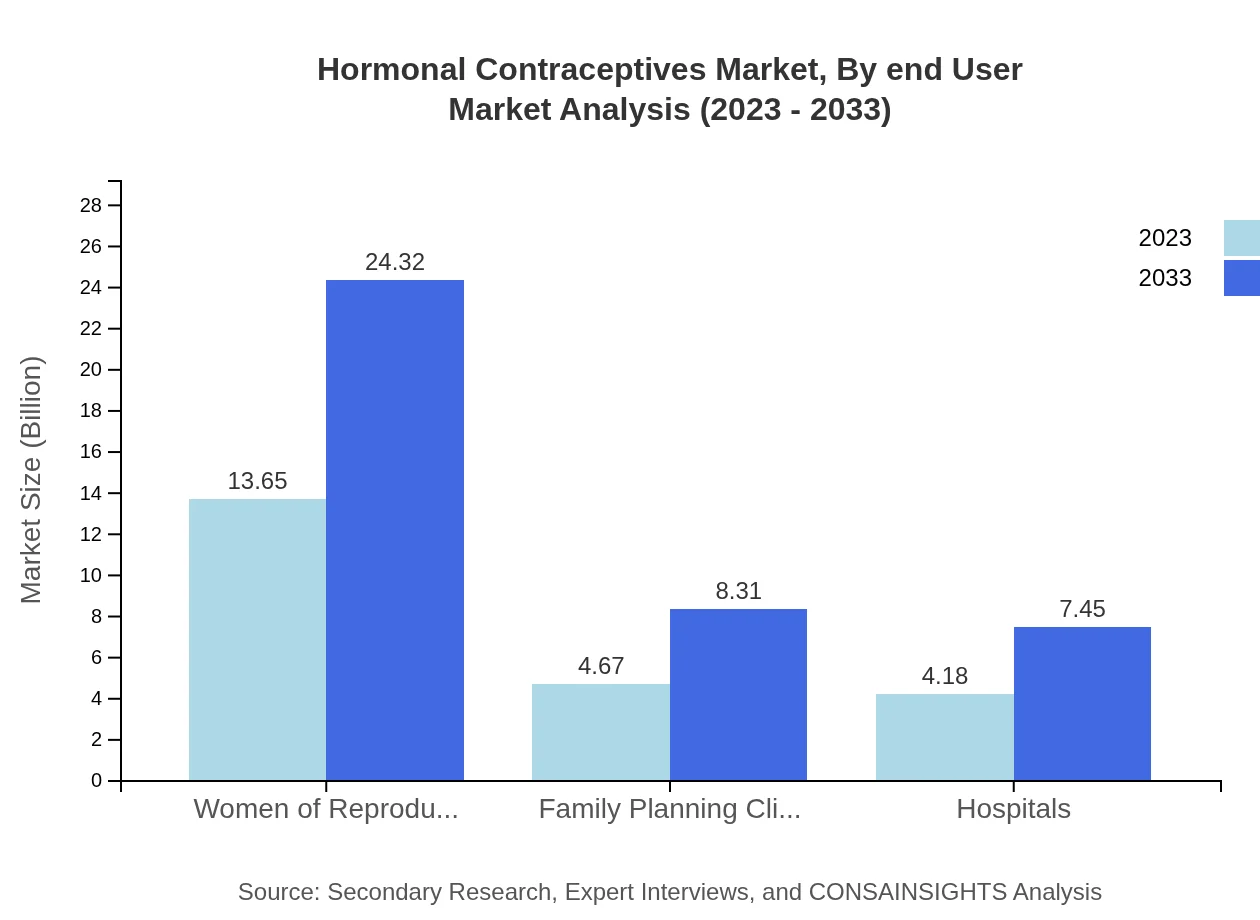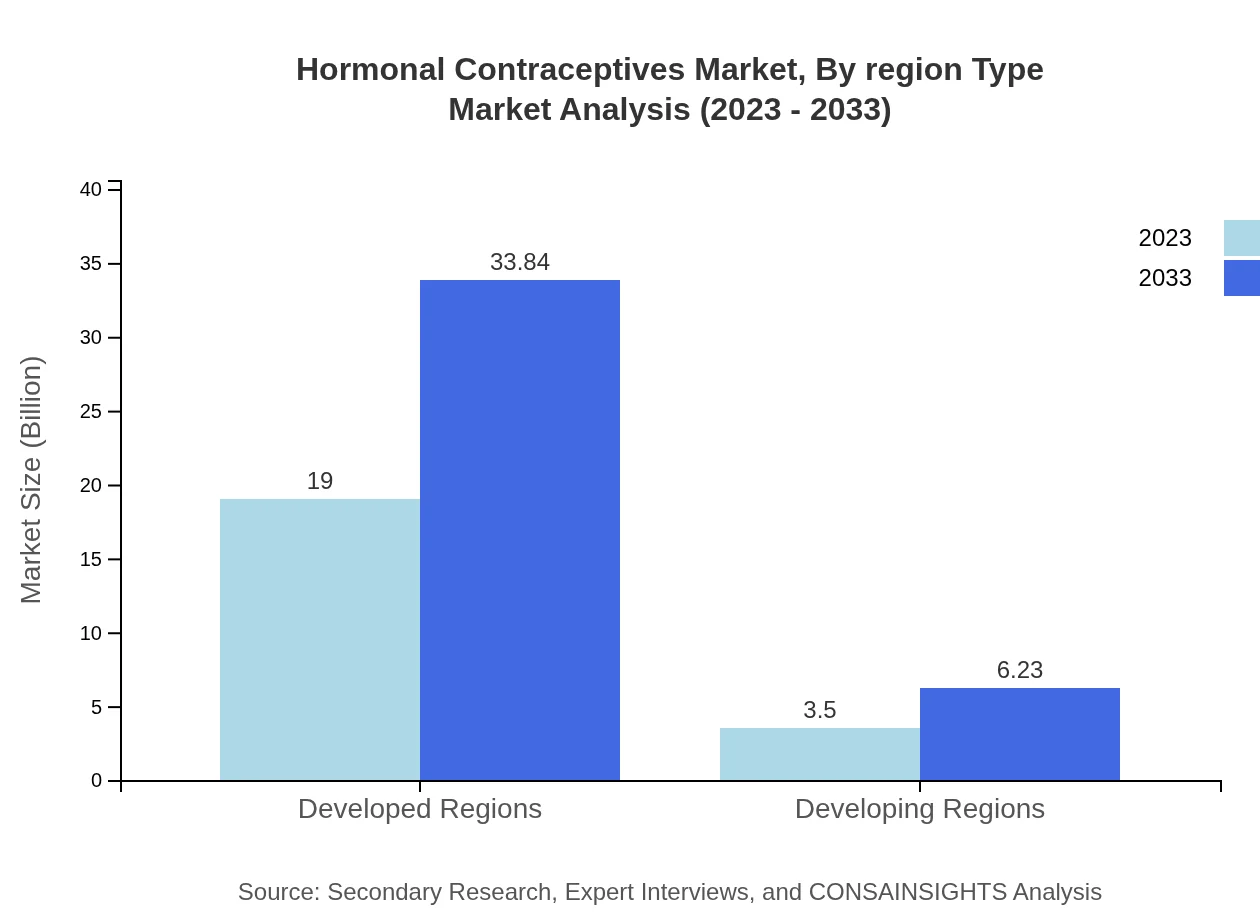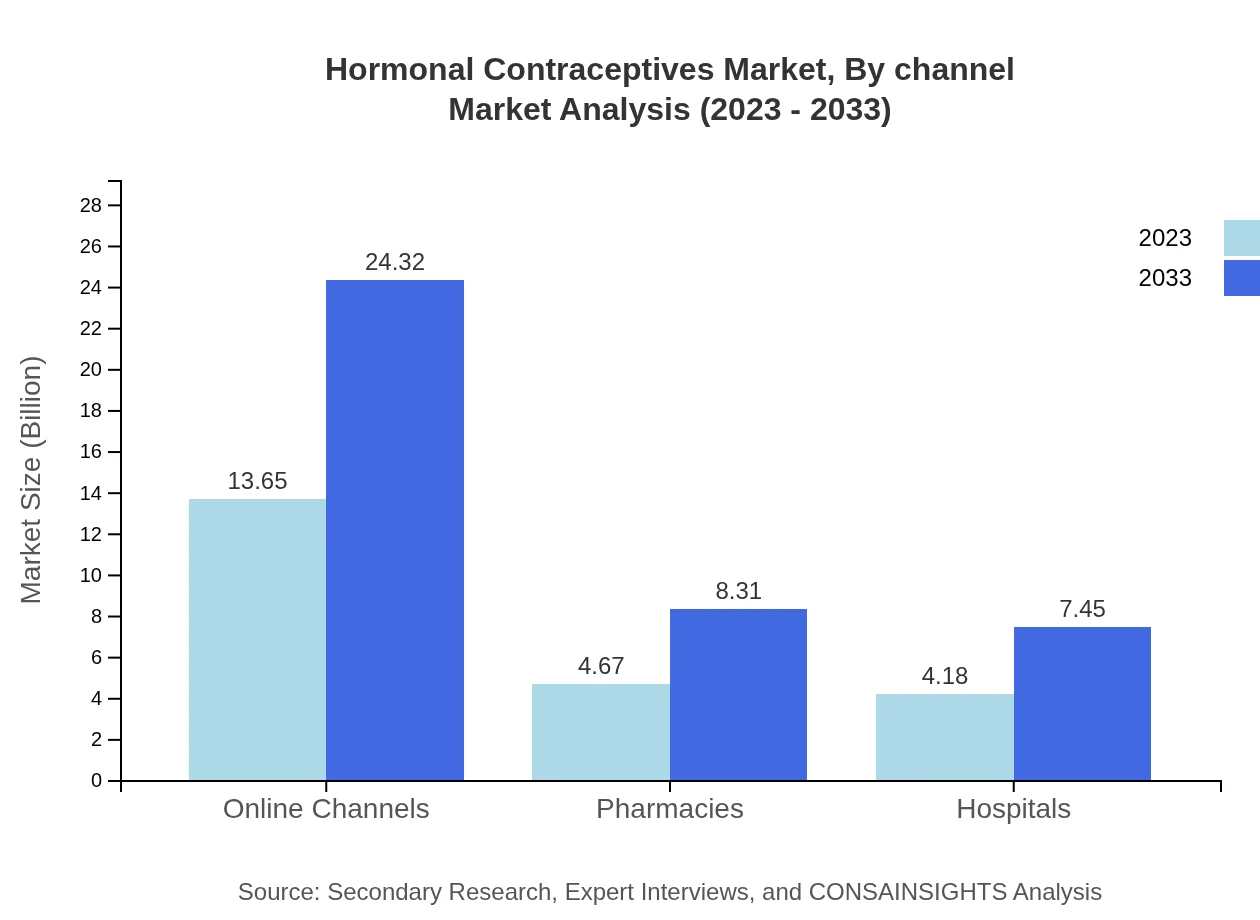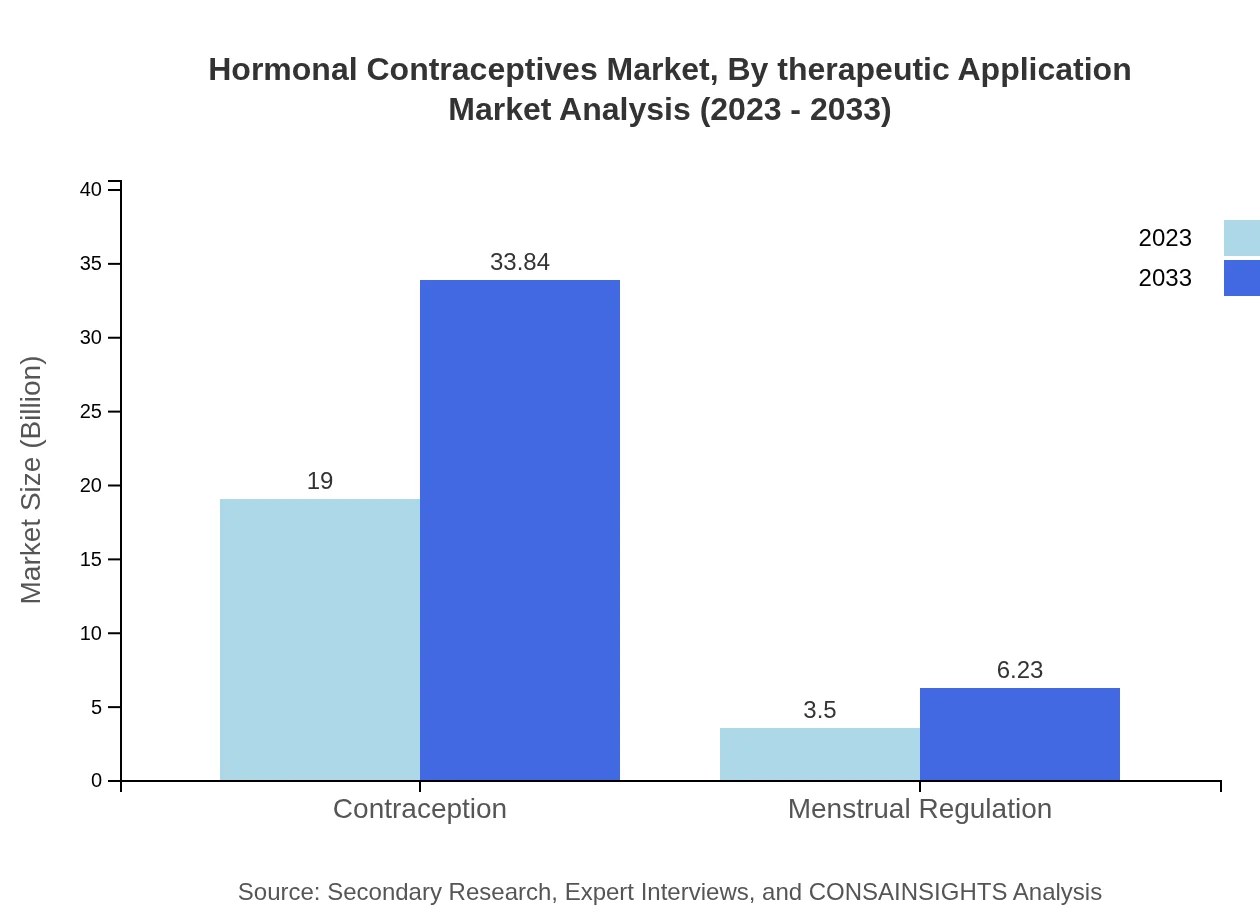Hormonal Contraceptives Market Report
Published Date: 31 January 2026 | Report Code: hormonal-contraceptives
Hormonal Contraceptives Market Size, Share, Industry Trends and Forecast to 2033
This report provides a comprehensive analysis of the Hormonal Contraceptives market, highlighting key insights and data from 2023 to 2033, including market size, growth trends, segmentation, and regional dynamics.
| Metric | Value |
|---|---|
| Study Period | 2023 - 2033 |
| 2023 Market Size | $22.50 Billion |
| CAGR (2023-2033) | 5.8% |
| 2033 Market Size | $40.08 Billion |
| Top Companies | Bayer AG, Johnson & Johnson, Merck & Co., Teva Pharmaceutical Industries |
| Last Modified Date | 31 January 2026 |
Hormonal Contraceptives Market Overview
Customize Hormonal Contraceptives Market Report market research report
- ✔ Get in-depth analysis of Hormonal Contraceptives market size, growth, and forecasts.
- ✔ Understand Hormonal Contraceptives's regional dynamics and industry-specific trends.
- ✔ Identify potential applications, end-user demand, and growth segments in Hormonal Contraceptives
What is the Market Size & CAGR of Hormonal Contraceptives market in 2023?
Hormonal Contraceptives Industry Analysis
Hormonal Contraceptives Market Segmentation and Scope
Tell us your focus area and get a customized research report.
Hormonal Contraceptives Market Analysis Report by Region
Europe Hormonal Contraceptives Market Report:
Europe’s market, expected to grow from $6.03 billion in 2023 to $10.74 billion by 2033, benefits from established healthcare infrastructure and a strong emphasis on reproductive rights. Comprehensive healthcare policies further aid market penetration.Asia Pacific Hormonal Contraceptives Market Report:
The Asia Pacific region, valued at $4.29 billion in 2023, is projected to reach $7.63 billion by 2033. Rapid urbanization, increased spending on healthcare, and emerging markets in countries like India and China present significant growth opportunities. Furthermore, societal shifts towards family planning are driving market expansion.North America Hormonal Contraceptives Market Report:
In North America, the hormonal contraceptives market is projected to rise from $8.66 billion in 2023 to $15.42 billion by 2033. The high acceptance of contraceptive methods, coupled with innovations in delivery mechanisms, supports this robust growth.South America Hormonal Contraceptives Market Report:
The South American market is anticipated to grow from $1.12 billion in 2023 to $2.00 billion by 2033. Limited access to contraception in rural areas poses challenges, yet growing healthcare initiatives and awareness campaigns are expected to enhance market growth.Middle East & Africa Hormonal Contraceptives Market Report:
The market in the Middle East and Africa region is expected to rise from $2.40 billion in 2023 to $4.28 billion by 2033. Growth is driven by increasing public health initiatives and improved access to family planning resources across the region.Tell us your focus area and get a customized research report.
Hormonal Contraceptives Market Analysis By Product Type
The Hormonal Contraceptives Market, segmented by product type, includes oral contraceptives, injectable contraceptives, implant-based contraceptives, transdermal patches, and intrauterine devices (IUDs). Oral contraceptives dominate the market, with a size of $9.81 billion in 2023, projected to grow to $17.48 billion by 2033. Injectable contraceptives follow closely, valued at $5.31 billion in 2023, expected to reach $9.46 billion. Implantable contraceptives show promising growth as well, anticipating a climb from $2.38 billion to $4.23 billion within the decade.
Hormonal Contraceptives Market Analysis By End User
The end-user segments of the hormonal contraceptives market are primarily women of reproductive age, family planning clinics, pharmacies, and hospitals. The largest segment, women of reproductive age, is expected to hold a substantial share, driven by increased contraceptive usage. Family planning clinics and pharmacies represent significant distribution channels, with respective market sizes projected to grow from $4.67 billion in 2023 to $8.31 billion and $4.18 billion to $7.45 billion by 2033.
Hormonal Contraceptives Market Analysis By Region Type
Regional analysis indicates a diverse landscape across developed and developing regions. Developed regions are expected to command a market size of $19.00 billion in 2023, increasing to $33.84 billion by 2033, while developing regions project growth from $3.50 billion to $6.23 billion, underscoring the disparities in access to hormonal contraceptives.
Hormonal Contraceptives Market Analysis By Channel
Distribution channels for hormonal contraceptives include online channels, pharmacies, hospitals, and family planning clinics. Online channels are a growing segment, with size forecasted to reach $24.32 billion by 2033, maintaining a consistent market share of approximately 60.68%. Pharmacies also showcase growth potential, projected to increase from $4.67 billion in 2023 to $8.31 billion by 2033.
Hormonal Contraceptives Market Analysis By Therapeutic Application
Therapeutic applications primarily encompass family planning, with a market size anticipated to rise from $19.00 billion in 2023 to $33.84 billion by 2033. Menstrual regulation, another significant segment, shows growth from $3.50 billion to $6.23 billion, reflecting increased awareness and demand for reproductive health solutions.
Hormonal Contraceptives Market Trends and Future Forecast
Tell us your focus area and get a customized research report.
Global Market Leaders and Top Companies in Hormonal Contraceptives Industry
Bayer AG:
Bayer AG is a global leader in the pharmaceutical sector, offering comprehensive contraceptive solutions including various oral and injectable hormonal contraceptives. Their commitment to innovation positions them at the forefront of the industry.Johnson & Johnson:
Johnson & Johnson excels in the healthcare sector, providing a breadth of contraceptive products, including innovative delivery systems that enhance accessibility and user convenience in hormonal contraceptive solutions.Merck & Co.:
Merck & Co. is known for producing a range of contraceptive options, with a strong emphasis on research and development. Their portfolio includes well-established products that cater to diverse consumer needs in the hormonal contraceptive space.Teva Pharmaceutical Industries:
Teva specializes in generic medications, including affordable hormonal contraceptive options, improving market access and affordability while maintaining product efficacy and safety.We're grateful to work with incredible clients.









FAQs
What is the market size of hormonal Contraceptives?
The hormonal contraceptives market size is projected to reach approximately $22.5 billion by 2033, expanding at a CAGR of 5.8% from 2023. This growth indicates increasing demand for reproductive health solutions globally.
What are the key market players or companies in this hormonal Contraceptives industry?
Key market players include major pharmaceutical companies producing hormonal contraceptives, emphasizing innovation and strategic partnerships to expand product offerings and market reach in the global arena.
What are the primary factors driving the growth in the hormonal contraceptives industry?
Growth in the hormonal contraceptives industry is primarily driven by increasing awareness of family planning, advancements in contraceptive technology, and rising acceptance of hormonal methods among women.
Which region is the fastest Growing in the hormonal contraceptives?
North America is the fastest-growing region in the hormonal contraceptives market, projected to increase from $8.66 billion in 2023 to $15.42 billion in 2033, highlighting robust market demand and healthcare accessibility.
Does ConsaInsights provide customized market report data for the hormonal Contraceptives industry?
Yes, ConsaInsights provides customized market report data tailored to client specifications in the hormonal contraceptives industry, enabling businesses to gain insights specific to their needs and sector dynamics.
What deliverables can I expect from this hormonal Contraceptives market research project?
Expect comprehensive deliverables including market analysis reports, regional trends, segment performance data, competitive landscape assessments, and tailored recommendations for strategic business planning.
What are the market trends of hormonal Contraceptives?
Current trends in hormonal contraceptives include a shift towards online sales channels, increased use of telehealth services, and growing demand for non-invasive contraceptive methods, reflecting the evolving preferences of consumers.

